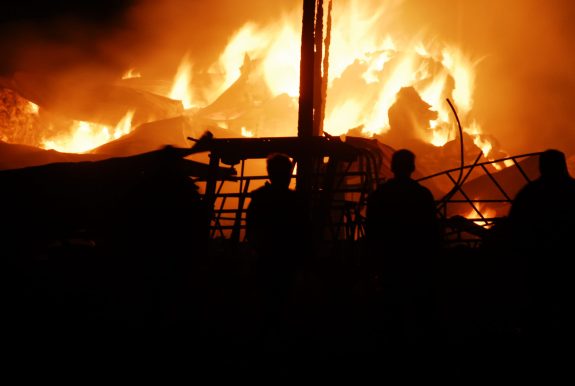It’s no secret that the meat industry puts animal welfare at the very bottom of its priority list. But a new interview with Ontario Federation of Agriculture president Don McCabe on CBC radio’s As It Happens really takes the cake.
McCabe joined As It Happens on Tuesday to respond to the recent spate of barn fires in Canada, which have seen over 50,000 horses, pigs, cows, goats, and ducks literally burned alive in nearly a dozen separate incidents over the last month.
Animal advocates have been demanding for years that provincial governments update barn fire codes to stop these devastating massacres, since it’s clear that the industry will continue to refuse to protect animals from being burned to death unless they’re forced to.
But instead of displaying even the tiniest bit of remorse over farmers’ failure to act, McCabe tried to blame the animals themselves for barn burnings, stating that in the cold weather farmers have to “probably look at offering [animals] some heat.” But “goats are an extremely inquisitive animal and… they can knock over a heat lamp.” McCabe went on to explain that other animals like raccoons, possums, rats, and mice move into barns, chew wires, and cause fires. He concludes that the barn burnings are just a series of “unfortunate accidents happening to really good people.”
Um, animals cause the fires? Talk about blaming the victim.
Accidents? An accident is an unexpected incident, but barn fires are common and predictable.
So it’s not the fault of the industry for not setting standards, or a farmer who fails to put sprinkler systems in the barn? Apparently not.
When McCabe was asked about farmers’ responsibility to prevent fires, he opined that sprinklers are not a “feasible opportunity” because pipes might freeze. Of course, frozen pipes can be addressed if the farmer heats the barn, which should happen anyway.
But McCabe’s disregard for the animal victims of barn fires is most on display when asked why so few animals are rescued from fires. Unbelievably, McCabe stated that animals will run back into burning barns even if they are rescued because “that’s home to them.” And even if someone cared enough to rescue them, McCabe points out that there’s nowhere to put animals because the facility they’re supposed to be stored in is on fire and they’re not used to being outside.
McCabe goes on to say that barn fires are difficult for firefighters because “you’re responding to a friend or neighbour or usually somebody you know.” Apparently he doesn’t think firefighters will be bothered that thousands of animals are being burned alive because government and the industry failed to act.
McCabe wraps up the interview by emphasizing how it’s unfortunate that animals die, not because animals are unique individuals who can suffer, but because of their monetary value: “they’re assets, but there’s also going to be wonderful genetics in that barn.” McCabe believes it’s important that “we give the necessary condolences to the folks that were involved here so they can get on to the next opportunities for themselves.”
It’s revealing that McCabe can’t even be bothered to pay lip service to the animals who suffered while being burned alive. But that’s exactly why we’re in this situation in the first place—because government and industry place so little value on the lives and welfare of animals that they’re willing to let them burn alive rather than update barn standards. So long as the farming industry treats animals like commodities instead of individuals with personalities and feelings, the suffering will continue.




